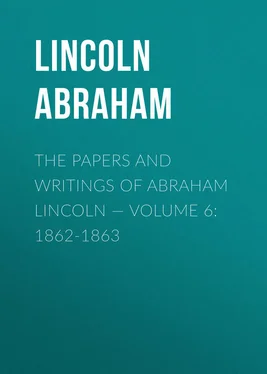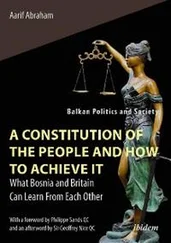Abraham Lincoln - The Papers And Writings Of Abraham Lincoln — Volume 6 - 1862-1863
Здесь есть возможность читать онлайн «Abraham Lincoln - The Papers And Writings Of Abraham Lincoln — Volume 6 - 1862-1863» — ознакомительный отрывок электронной книги совершенно бесплатно, а после прочтения отрывка купить полную версию. В некоторых случаях можно слушать аудио, скачать через торрент в формате fb2 и присутствует краткое содержание. Жанр: foreign_antique, foreign_prose, на английском языке. Описание произведения, (предисловие) а так же отзывы посетителей доступны на портале библиотеки ЛибКат.
- Название:The Papers And Writings Of Abraham Lincoln — Volume 6: 1862-1863
- Автор:
- Жанр:
- Год:неизвестен
- ISBN:нет данных
- Рейтинг книги:3 / 5. Голосов: 1
-
Избранное:Добавить в избранное
- Отзывы:
-
Ваша оценка:
- 60
- 1
- 2
- 3
- 4
- 5
The Papers And Writings Of Abraham Lincoln — Volume 6: 1862-1863: краткое содержание, описание и аннотация
Предлагаем к чтению аннотацию, описание, краткое содержание или предисловие (зависит от того, что написал сам автор книги «The Papers And Writings Of Abraham Lincoln — Volume 6: 1862-1863»). Если вы не нашли необходимую информацию о книге — напишите в комментариях, мы постараемся отыскать её.
The Papers And Writings Of Abraham Lincoln — Volume 6: 1862-1863 — читать онлайн ознакомительный отрывок
Ниже представлен текст книги, разбитый по страницам. Система сохранения места последней прочитанной страницы, позволяет с удобством читать онлайн бесплатно книгу «The Papers And Writings Of Abraham Lincoln — Volume 6: 1862-1863», без необходимости каждый раз заново искать на чём Вы остановились. Поставьте закладку, и сможете в любой момент перейти на страницу, на которой закончили чтение.
Интервал:
Закладка:
"Resolved, That Simon Cameron, late Secretary of War by investing Alexander Cummings with the control of large sums of the public money and authority to purchase military supplies without restriction, without requiring from him any guaranty for the faithful performance of his duties, when the services of competent public officers were available, and by involving the government in a vast number of contracts with persons not legitimately engaged in the business pertaining to the subject-matter of such contracts, especially in the purchase of arms for future delivery, has adopted a policy highly injurious to the public service, and deserves the censure of the House."
Congress will see that I should be wanting equally in candor and in justice if I should leave the censure expressed in this resolution to rest exclusively or chiefly upon Mr. Cameron. The same sentiment is unanimously entertained by the heads of department who participated in the proceedings which the House of Representatives have censured. It is due to Mr. Cameron to say that although he fully approved the proceedings they were not moved nor suggested by himself, and that not only the President, but all the other heads of departments, were at least equally responsible with him for whatever error, wrong, or fault was committed in the premises.
A. LINCOLN.
TELEGRAM TO GENERAL G. B. McCLELLAN
MAJOR-GENERAL McCLELLAN:
We have General Banks's official report. He has saved his army and baggage, and has made a safe retreat to the river, and is probably safe at Williamsport. He reports the attacking force at 15,000.
A. LINCOLN, President.
TELEGRAM TO GENERAL I. McDOWELL
MAJOR-GENERAL McDOWELL, Falmouth, Virginia:
Despatches from Geary just received have been sent you. Should not the remainder of your forces, except sufficient to hold the point at Fredericksburg, move this way — to Manassas Junction or Alexandria? As commander of this department, should you not be here? I ask these questions.
A. LINCOLN.
TELEGRAM TO GENERAL McCLELLAN
MAJOR-GENERAL GEORGE B. McCLELLAN:
Can you not cut the Alula Creek railroad? Also, what impression have you as to intrenched works for you to contend with in front of Richmond? Can you get near enough to throw shells into the city?
A. LINCOLN, President.
TELEGRAM TO GENERAL J. C. FREMONT
MAJOR-GENERAL FREMONT:
I see that you are at Moorefield. You were expressly ordered to march to Harrisonburg. What does this mean?
A. LINCOLN.
TELEGRAM FROM SECRETARY STANTON TO GOVERNOR ANDREW
GOVERNOR ANDREW, Boston:
The President directs that the militia be relieved, and the enlistments made for three years, or during the war. This, I think, will practically not be longer than for a year. The latest intelligence from General Banks states that he has saved nearly his whole command with small loss.
Concentrations of our force have been made, which it is hoped will capture the enemy.
EDWIN M. STANTON, Secretary of War.
TELEGRAM FROM SECRETARY STANTON TO GENERAL J. C. FREMONT,
MAJOR-GENERAL FREMONT, Moorefield
The President directs you to halt at Moorefield and await orders, unless you hear of the enemy being in the general direction of Rodney, in which case you will move upon him. Acknowledge the receipt of this order, and the hour it is received.
EDWIN M. STANTON, Secretary of War.
TELEGRAM TO GENERAL I. McDOWELL
GENERAL McDOWELL, Manassas Junction:
General McClellan at 6.30 P.M. yesterday telegraphed that Fitz-John Porter's division had fought and driven 13,000 of the enemy, under General Branch, from Hanover Court-House, and was driving them from a stand they had made on the railroad at the time the messenger left. Two hours later he telegraphed that Stoneman had captured an engine and six cars on the Virginia Central, which he at once sent to communicate with Porter. Nothing further from McClellan.
If Porter effects a lodgment on both railroads near Hanover Court-House, consider whether your forces in front of Fredericksburg should not push through and join him.
A. LINCOLN.
TELEGRAM TO GENERAL G. B. McCLELLAN
MAJOR-GENERAL McCLELLAN:
What of F.J. Porter's expedition? Please answer.
A. LINCOLN.
TELEGRAM TO GENERAL I. McDOWELL
GENERAL McDOWELL, Manassas Junction:
You say General Geary's scouts report that they find no enemy this side of the Blue Ridge. Neither do I. Have they been to the Blue Ridge looking for them.
A. LINCOLN.
TELEGRAM TO GENERAL I. McDOWELL
GENERAL McDOWELL, Manassas Junction:
I think the evidence now preponderates that Ewell and Jackson are still about Winchester. Assuming this, it is for you a question of legs. Put in all the speed you can. I have told Fremont as much, and directed him to drive at them as fast as possible. By the way, I suppose you know Fremont has got up to Moorefield, instead of going into Harrisonburg.
A. LINCOLN.
TELEGRAM TO GENERAL G. B. McCLELLAN
MAJOR-GENERAL McCLELLAN:
I am very glad of General F. J. Porter's victory. Still, if it was a total rout of the enemy, I am puzzled to know why the Richmond and Fredericksburg railroad was not seized again, as you say you have all the railroads but the Richmond and Fredericksburg. I am puzzled to see how, lacking that, you can have any, except the scrap from Richmond to West Point. The scrap of the Virginia Central from Richmond to Hanover Junction, without more, is simply nothing. That the whole of the enemy is concentrating on Richmond, I think cannot be certainly known to you or me. Saxton, at Harper's Ferry informs us that large forces, supposed to be Jackson's and Ewells, forced his advance from Charlestown today. General King telegraphs us from Fredericksburg that contrabands give certain information that 15,000 left Hanover Junction Monday morning to reinforce Jackson. I am painfully impressed with the importance of the struggle before you, and shall aid you all I can consistently with my view of due regard to all points.
A. LINCOLN.
TELEGRAM FROM SECRETARY STANTON TO GENERAL FREMONT
MAJOR-GENERAL JOHN C. FREMONT, Moorefield:
The order to remain at Moorefield was based on the supposition that it would find you there.
Upon subsequent information that the enemy were still operating in the vicinity of Winchester and Martinsburg, you were directed to move against the enemy.
The President now again directs you to move against the enemy without delay. Please acknowledge the receipt of this, and the time received.
EDWIN M. STANTON, Secretary of War.
TELEGRAM TO GENERAL MARCY
GENERAL R. B. MARCY, McClellan's Headquarters:
Yours just received. I think it cannot be certainly known whether the force which fought General Porter is the same which recently confronted McDowell. Another item of evidence bearing on it is that General Branch commanded against Porter, while it was General Anderson who was in front of McDowell. He and McDowell were in correspondence about prisoners.
Читать дальшеИнтервал:
Закладка:
Похожие книги на «The Papers And Writings Of Abraham Lincoln — Volume 6: 1862-1863»
Представляем Вашему вниманию похожие книги на «The Papers And Writings Of Abraham Lincoln — Volume 6: 1862-1863» списком для выбора. Мы отобрали схожую по названию и смыслу литературу в надежде предоставить читателям больше вариантов отыскать новые, интересные, ещё непрочитанные произведения.
Обсуждение, отзывы о книге «The Papers And Writings Of Abraham Lincoln — Volume 6: 1862-1863» и просто собственные мнения читателей. Оставьте ваши комментарии, напишите, что Вы думаете о произведении, его смысле или главных героях. Укажите что конкретно понравилось, а что нет, и почему Вы так считаете.












